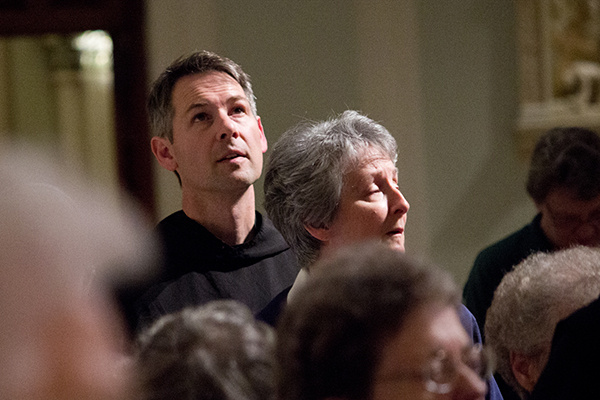Understanding Our Christian Vocation
Fr. Adrian Burke, OSB
Thursday, October 17, 2019

"See how the Lord in his love shows us the way of life. Clothed then with faith and the performance of good works, let us set out on this way..."
Rule of St. Benedict, Prol. 20-21
Back when I was initially considering leaving the business world to pursue studies for the priesthood, I often framed it as deciding to follow Jesus. Of course, one doesn’t have to go off to a seminary to “follow Jesus.” One can do that in whatever circumstances or situation one finds oneself – the business world, family or farm life, serving as a teacher, a medical professional, or a beautician, for that matter.
What matters most, in fact, is not what we do in life as much as why we are doing it and how. Can we frame what we do and how we do it as ways of expressing our faith in God, as ways of following Jesus? This is the key to understanding “vocation” - our “calling” – as Christians.
For St. Benedict, following Christ is a matter of dedicating one’s whole life to God by adopting God’s ways, especially as depicted in the gospels. To do this, we have to learn to trust God enough to surrender our preference for merely human ways of thinking, particularly our competitive, rivalrous attitudes, and learn to attend to the needs of others before we think too much about what’s good for ourselves (RB 72.7, on the good zeal of monks).
To do this more habitually takes time. Change doesn’t happen overnight or in a single act of determination. It takes a long time, if we’re being honest, to learn to trust God enough to relinquish our old, time-worn habits of behavior, whether they be sinful or just selfish.
Benedict, aware of this, doesn’t demand his monks be flawless, which would be unreasonable and unjust, but he does establish rules of conduct to guide us in “translating into action [God’s] holy teaching” (RB Prol:35). He also legislates for consequences when we fail in charity, or in our duty or responsibilities, especially as they pertain to the monastic ideals of obedience, poverty, mutual care and concern, respect for authority and order, and the like.
Monastic life is a way of following Christ. Every Christian worthy of the name is “on the way” as well. Monks, and “religious” more generally, have it easier than the rest since we have a rule that guides us in Christ-like living. Like the bumpers on a bowling lane, the Rule of St. Benedict keeps us monks from falling into the gutter.
But a rule isn’t enough. We also need a living, flesh-and-blood community to help us interpret and put into action the ideals and imperatives of the Gospel. We can’t go it alone, no Christian can; we all need community – a parish, a church congregation, or a religious community - to help us “stay the course.”
It was through this Benedictine community of men that God voiced his call to me. I came here for the seminary, but by attending services in the Abbey Church now and then, and getting to know awesome teachers and classmates who wore the habit of a monk, I heard the delightful voice of the Lord calling to me (RB Prol. 19).
Now, as a full-fledged monk, I continue to hear God’s voice as a man who yearns for life and desires to see good days (Ps 34:13), because that yearning, that desire, opens the ears of the heart to the voice of Christ that calls out, Follow me (Jesus’ invitation appears 31 times in the Gospels).
That is the stuff of faith: a yearning, a desire, and ears that hear what the Spirit is saying (Rev. 2:7). “Clothed in this faith … let us set out on the way … that we may one day see him who has called us to his Kingdom!” (RB Prol. 21)